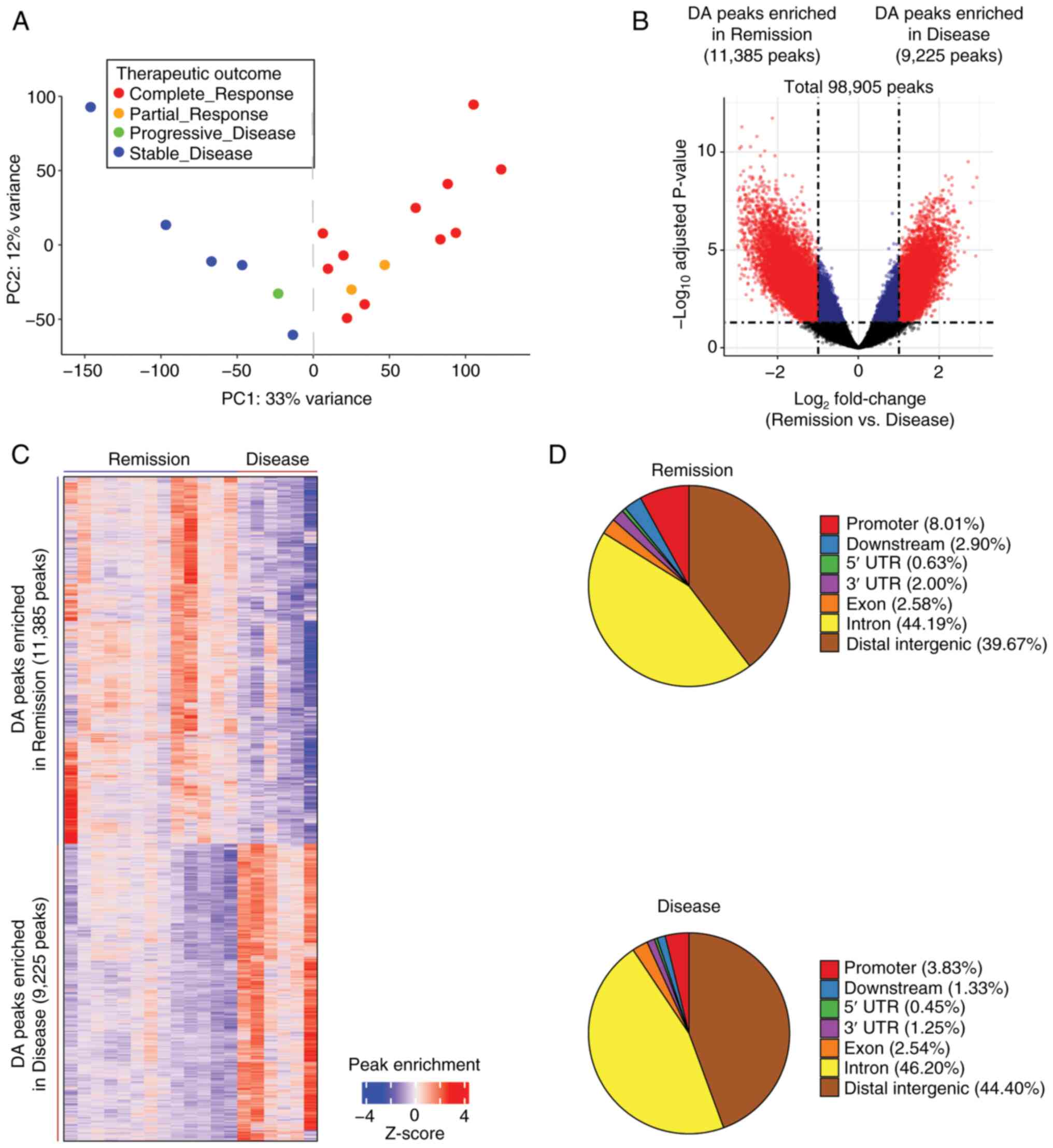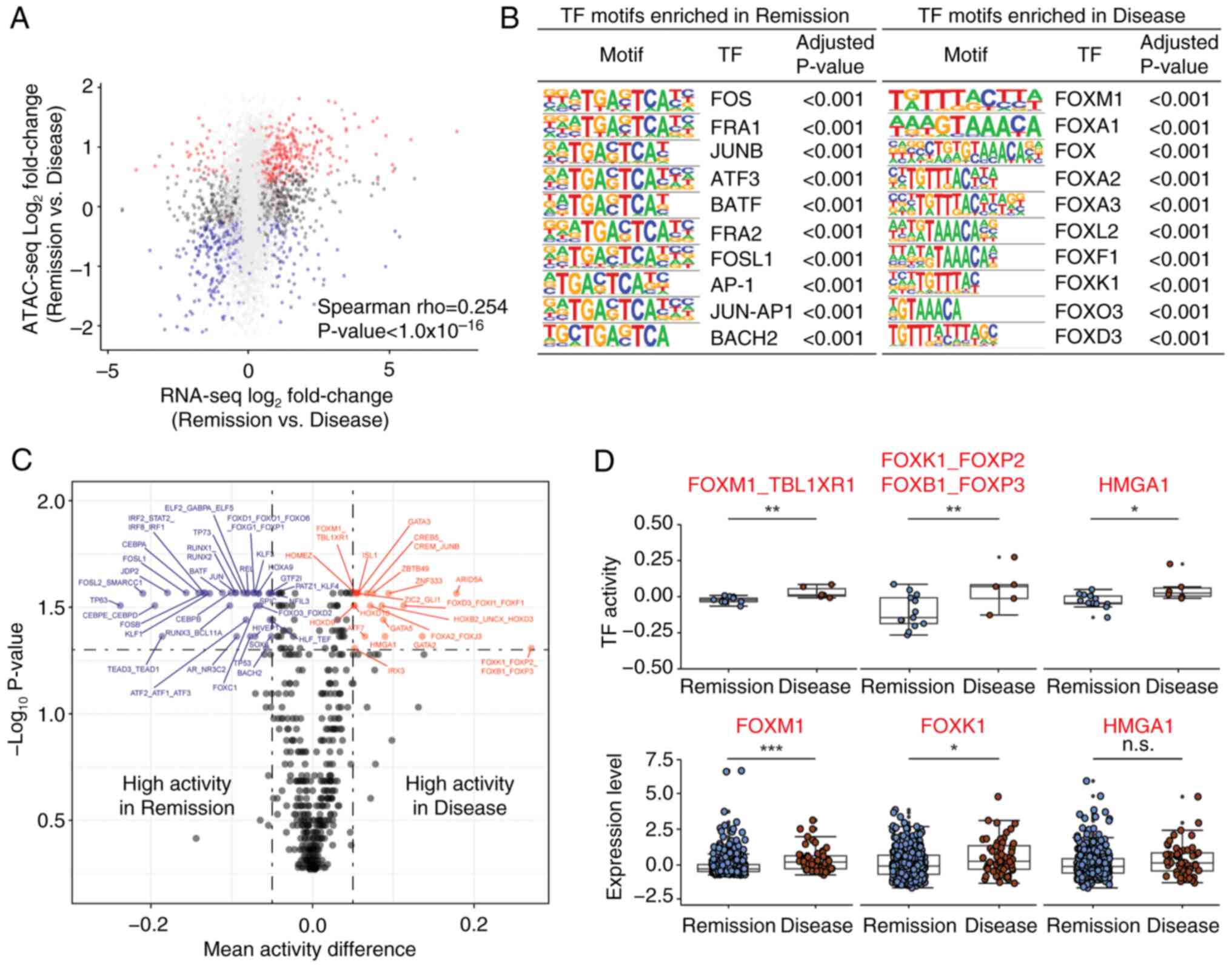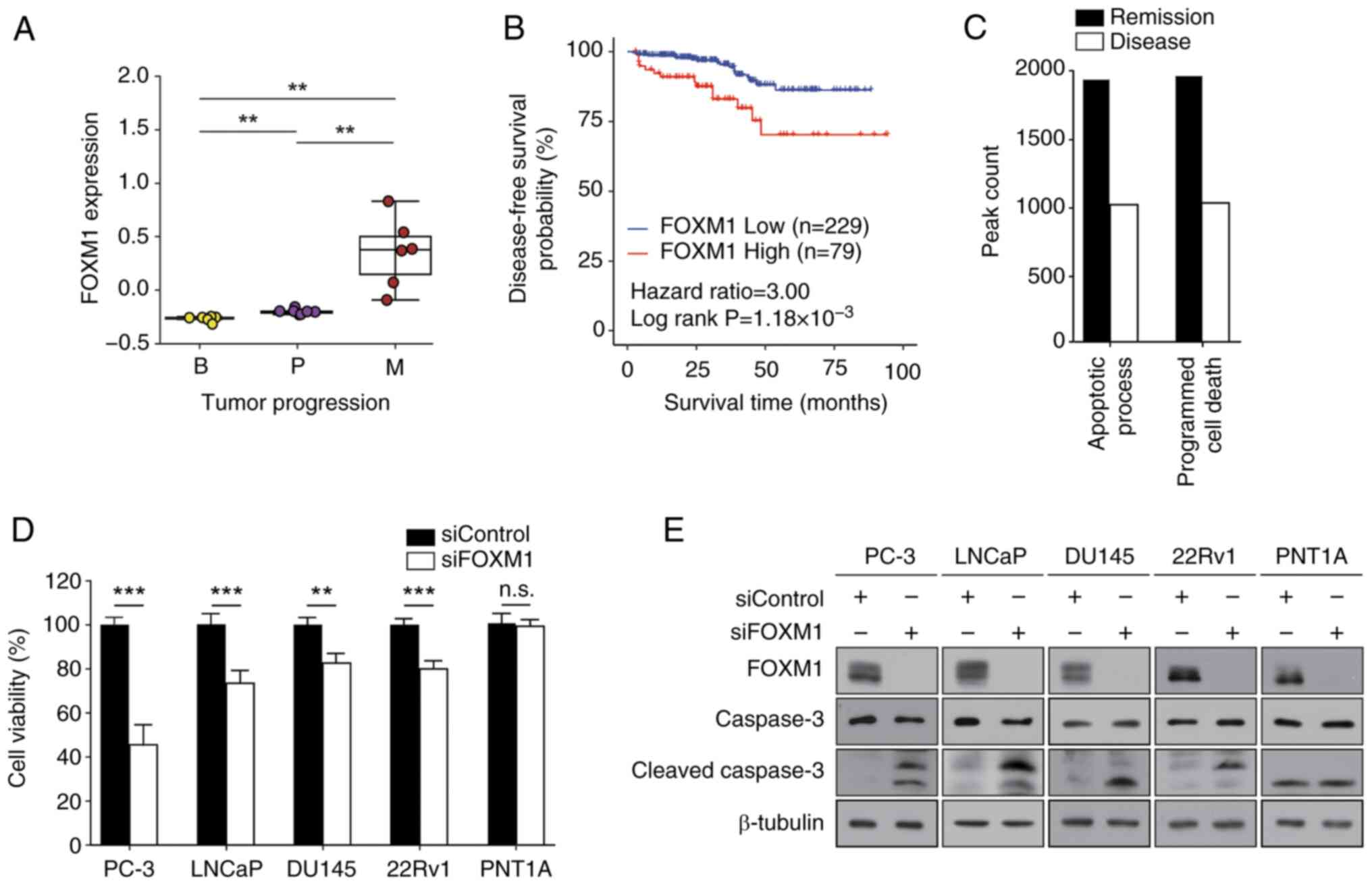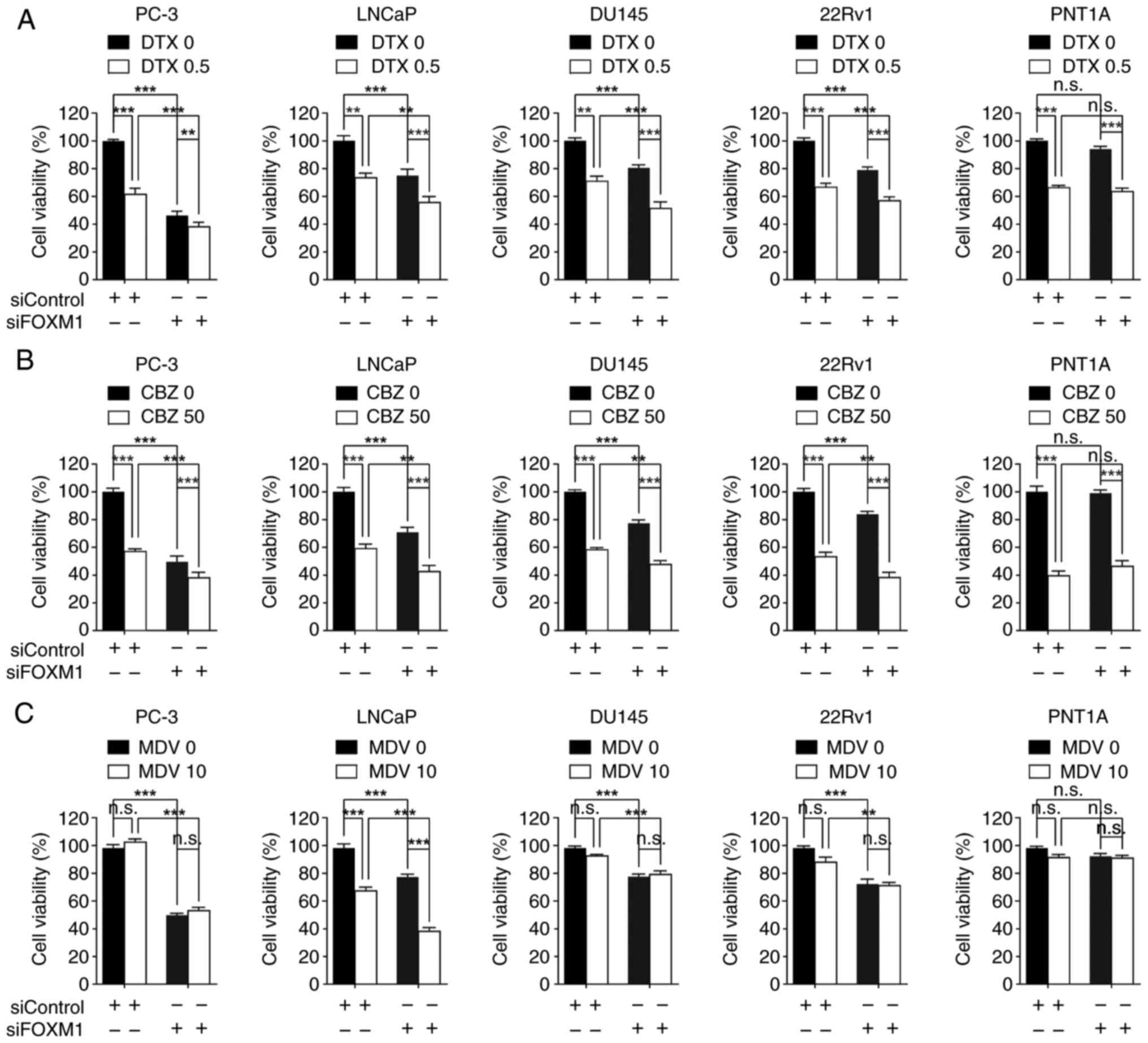|
1
|
Chandrasekar T, Yang JC, Gao AC and Evans
CP: Mechanisms of resistance in castration-resistant prostate
cancer (CRPC). Transl Androl Urol. 4:365–380. 2015.
|
|
2
|
Dai C, Dehm SM and Sharifi N: Targeting
the androgen signaling axis in prostate cancer. J Clin Oncol.
41:4267–4278. 2023. View Article : Google Scholar
|
|
3
|
Park S, Kim YS, Kim DY, So I and Jeon JH:
PI3K pathway in prostate cancer: All resistant roads lead to PI3K.
Biochim Biophys Acta Rev Cancer. 1870:198–206. 2018. View Article : Google Scholar
|
|
4
|
Cai M, Song XL, Li XA, Chen M, Guo J, Yang
DH, Chen Z and Zhao SC: Current therapy and drug resistance in
metastatic castration-resistant prostate cancer. Drug Resist Updat.
68:1009622023. View Article : Google Scholar
|
|
5
|
Gebrael G, Fortuna GG, Sayegh N, Swami U
and Agarwal N: Advances in the treatment of metastatic prostate
cancer. Trends Cancer. 9:840–854. 2023. View Article : Google Scholar
|
|
6
|
Bradner JE, Hnisz D and Young RA:
Transcriptional Addiction in Cancer. Cell. 168:629–643. 2017.
View Article : Google Scholar
|
|
7
|
Bhagwat AS and Vakoc CR: Targeting
transcription factors in cancer. Trends Cancer. 1:53–65. 2015.
View Article : Google Scholar
|
|
8
|
Bushweller JH: Targeting transcription
factors in cancer-From undruggable to reality. Nat Rev Cancer.
19:611–624. 2019. View Article : Google Scholar
|
|
9
|
Shiah JV, Johnson DE and Grandis JR:
Transcription factors and cancer: Approaches to Targeting. Cancer
J. 29:38–46. 2023. View Article : Google Scholar
|
|
10
|
Corces MR, Granja JM, Shams S, Louie BH,
Seoane JA, Zhou W, Silva TC, Groeneveld C, Wong CK, Cho SW, et al:
The chromatin accessibility landscape of primary human cancers.
Science. 362:eaav18982018. View Article : Google Scholar
|
|
11
|
Tang F, Xu D, Wang S, Wong CK,
Martinez-Fundichely A, Lee CJ, Cohen S, Park J, Hill CE, Eng K, et
al: Chromatin profiles classify castration-resistant prostate
cancers suggesting therapeutic targets. Science. 376:eabe15052022.
View Article : Google Scholar
|
|
12
|
McLean CY, Bristor D, Hiller M, Clarke SL,
Schaar BT, Lowe CB, Wenger AM and Bejerano G: GREAT improves
functional interpretation of cis-regulatory regions. Nat
Biotechnol. 28:495–501. 2010. View
Article : Google Scholar
|
|
13
|
Shan L, Zhao M, Lu Y, Ning H, Yang S, Song
Y, Chai W and Shi X: CENPE promotes lung adenocarcinoma
proliferation and is directly regulated by FOXM1. Int J Oncol.
55:257–266. 2019.
|
|
14
|
Park S, Lim JM, Chun JN, Lee S, Kim TM,
Kim DW, Kim SY, Bae DJ, Bae SM, So I, et al: Altered expression of
fucosylation pathway genes is associated with poor prognosis and
tumor metastasis in non-small cell lung cancer. Int J Oncol.
56:559–567. 2020.
|
|
15
|
Lee DY, Lee S, Kim YS, Park S, Bae SM, Cho
EA, Park EJ, Park HH, Kim SY, So I, et al: Cyclosporin A inhibits
prostate cancer growth through suppression of E2F8 transcription
factor in a MELK-dependent manner. Oncol Rep. 50:2182023.
View Article : Google Scholar
|
|
16
|
Lee S, Park YR, Kim SH, Park EJ, Kang MJ,
So I, Chun JN and Jeon JH: Geraniol suppresses prostate cancer
growth through down-regulation of E2F8. Cancer Med. 5:2899–2908.
2016. View
Article : Google Scholar
|
|
17
|
Marco E, Karp RL, Guo G, Robson P, Hart
AH, Trippa L and Yuan GC: Bifurcation analysis of single-cell gene
expression data reveals epigenetic landscape. Proc Natl Acad Sci
USA. 111:E5643–5650. 2014. View Article : Google Scholar
|
|
18
|
Eisenhauer EA, Therasse P, Bogaerts J,
Schwartz LH, Sargent D, Ford R, Dancey J, Arbuck S, Gwyther S,
Mooney M, et al: New response evaluation criteria in solid tumours:
Revised RECIST guideline (version 1.1). Eur J Cancer. 45:228–247.
2009. View Article : Google Scholar
|
|
19
|
Conteduca V, Hess J, Yamada Y, Ku SY and
Beltran H: Epigenetics in prostate cancer: Clinical implications.
Transl Androl Urol. 10:3104–3116. 2021. View Article : Google Scholar
|
|
20
|
Grandi FC, Modi H, Kampman L and Corces
MR: Chromatin accessibility profiling by ATAC-seq. Nat Protoc.
17:1518–1552. 2022. View Article : Google Scholar
|
|
21
|
Taavitsainen S, Engedal N, Cao S, Handle
F, Erickson A, Prekovic S, Wetterskog D, Tolonen T, Vuorinen EM,
Kiviaho A, et al: Single-cell ATAC and RNA sequencing reveal
pre-existing and persistent cells associated with prostate cancer
relapse. Nat Commun. 12:53072021. View Article : Google Scholar
|
|
22
|
Grbesa I, Augello MA, Liu D, McNally DR,
Gaffney CD, Huang D, Lin K, Ivenitsky D, Goueli R, Robinson BD, et
al: Reshaping of the androgen-driven chromatin landscape in normal
prostate cells by early cancer drivers and effect on therapeutic
sensitivity. Cell Rep. 36:1096252021. View Article : Google Scholar
|
|
23
|
Shrestha R, Chesner LN, Zhang M, Zhou S,
Foye A, Lundberg A, Weinstein AS, Sjöström M, Zhu X,
Moreno-Rodriguez T, et al: An atlas of accessible chromatin in
advanced prostate cancer reveals the epigenetic evolution during
tumor progression. Cancer Res. 84:3086–3100. 2024. View Article : Google Scholar
|
|
24
|
Bian X, Wang W, Abudurexiti M, Zhang X, Ma
W, Shi G, Du L, Xu M, Wang X, Tan C, et al: Integration analysis of
single-cell multi-omics reveals prostate cancer heterogeneity. Adv
Sci (Weinh). 11:e23057242024. View Article : Google Scholar
|
|
25
|
Katoh M, Igarashi M, Fukuda H, Nakagama H
and Katoh M: Cancer genetics and genomics of human FOX family
genes. Cancer Lett. 328:198–206. 2013. View Article : Google Scholar
|
|
26
|
Myatt SS and Lam EW: The emerging roles of
forkhead box (Fox) proteins in cancer. Nat Rev Cancer. 7:847–859.
2007. View
Article : Google Scholar
|
|
27
|
Castaneda M, Hollander PD and Mani SA:
Forkhead box transcription factors: Double-edged swords in cancer.
Cancer Res. 82:2057–2065. 2022. View Article : Google Scholar
|
|
28
|
Lee DY, Chun JN, So I and Jeon JH:
Oncogenic role of FOXM1 in human prostate cancer (Review). Oncol
Rep. 51:152024. View Article : Google Scholar
|


















